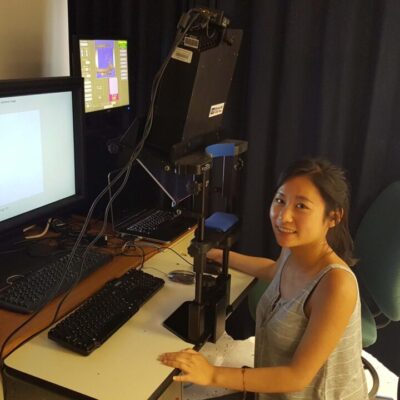Tiffany Fung Rose Hills
Investigating the development of a subject's trained preferred retinal locus in response to a simulated central scotoma
Age-related macular degeneration is the number 1 leading cause of blindness in the world. Macular degeneration is a central retina eye disease that leads to the atrophy of photoreceptors in the macular region of the eye and causes vision loss. AMD patients develop a scotoma, a blind spot, in the central part of their visual system. Their fovea, located in the macular region, which gives the highest acuity and resolution of vision, also becomes degenerate. The presence of a scotoma is associated with an increase in the number of eye fixations and disorganized eye movements. Patients tend to develop a preferred retinal locus, or PRL, in their peripheral vision to replace their fovea as a reference point for eye fixation and saccadic eye movements. Patients can develop multiple PRLs for different tasks. This helps them to cope with central vision loss. However, the mechanism behind the formation of a PRL and specific location of its development are still relatively unknown. This innate PRL may not always be the best PRL that offers the best visual acuity. In our research, we seek to train normally-sighted individuals presented with an artificial central scotoma to develop a trained PRL at an intended retinal locus and see if they can retain this trained PRL over time.
Similarly, when presented with an artifical gaze-centered scotoma, normally-sighted individuals also develop a PRL. This new locus acts as the new reference point for saccadic eye movements and regaining cognitive ability. In our research, we want to understand whether re-referencing of saccades or fixational eye movements are due to a change in motor strategy or perceptual learning. More importantly, this proposed study will assess how closely simualted scotomas on healthy individuals represent actual retinal degeneration in patients with central vision loss. Therefore, output of this research will inform the theories as well as training and rehabilitation practices on macular diseases.
Message To Sponsor
To the SURF Rose Hills Foundation, thank for for the funding for my summer SURF award. I hope to attend optometry graduate school in the future although I am personally unsure whether I am more interested in the research or clinical side of it. This summer will allow me to ascertain my path in the optometry world. I hope to gain more research experience in an intimate setting with my professor and postdoc, and I am sure I will learn so much more than I initially asked for!